A quick glance at 7 essential nutrients your body needs - Pristine Organics
(Or, A Strong Case For Diversifying Your Diet)
We all know that food gives us energy. It also contains essential nutrients that help in growth (physical and mental), good health and protection from disease.
The essential ingredients contained in food can be broken into 2 categories: macro- and micronutrients.
Macronutrients include the primary building blocks of our diet – which are basically protein, carbohydrates and fat. They give us energy, and are needed for the body’s growth, health and maintenance.
Micronutrients are essential vitamins and minerals needed in small doses, to fight disease, and support, regulate and maintain body functions such as metabolism, nervous system, blood pressure, and more.
Seven essential groups of nutrients are needed to keep us going.
Three macronutrients, which are:
1.Protein
High protein diets are trending, but before you up your protein intake, learn a bit more about it. Protein is made up of over 20 amino acids, some created by the body, some acquired from food. Virtually every cell of our body contains protein. It is needed for the growth of muscle, bone, skin and hair. It also helps power chemical reactions and is essential for a body’s health and maintenance.
Protein-rich foods include meat, eggs, fish, and of course, several plant-based sources like millet, beans, legumes, tofu, paneer and nuts.
Interesting fact: A grilled steak has higher protein content, about 33 g, but also packs in about 5g of saturated fat. A cup of dal on the other hand, has about 19 g of protein, but is loaded with fibre and has virtually no fat.
Interesting fact: A grilled steak has higher protein content, about 33 g, but also packs in about 5g of saturated fat. A cup of dal on the other hand, has about 19 g of protein, but is loaded with fibre and has virtually no fat.
2.Carbohydrates
Before you get carried away by the bad rap carbs are getting these days, know that carbohydrates are our main source of energy. They commonly appear in food in the form of sugars, fibers and starches, which are converted by the digestive system into the glucose that fuels us.
Worry less about the amount of carbohydrates you consume, more about the type.
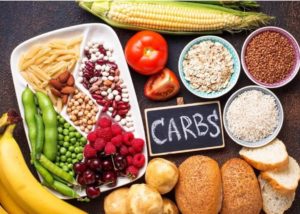 Carbohydrates come in 2 main forms: simple and complex. Simple sugars include food that’s naturally sweet, such as fruits, vegetables and milk. Food with sugar added during processing and refining also fall under this category. Simple sugars convert faster to glucose, which is used for energy. A part of the unused sugar (not needed for energy) is stored in the liver and muscles, and the rest is converted to fat.
Carbohydrates come in 2 main forms: simple and complex. Simple sugars include food that’s naturally sweet, such as fruits, vegetables and milk. Food with sugar added during processing and refining also fall under this category. Simple sugars convert faster to glucose, which is used for energy. A part of the unused sugar (not needed for energy) is stored in the liver and muscles, and the rest is converted to fat.
Complex or starchy carbs on the other hand, take longer to digest and thus release energy slowly. Leaving you satiated for longer. So the more processed and refined a carbohydrate is, the faster it will be broken down by the digestive system, giving you a whole lot of extra energy, which fizzles out fast, leaving behind spiking blood sugar levels and fat.
Healthy carbs include whole grains, beans, vegetables and fruits. Avoid easily-digested simple carbs like refined breads, pasta and food with sugar because they convert instantly to energy and the unused energy to fat.
Interesting fact: Whole grain when refined gets stripped of its bran and fibre, thus converting a complex carb into a simple one.
3.Fat
Forget the good fat vs bad fat argument for the moment and focus on the very real benefits of fat. Fat, also an energy source, facilitates the absorption of fat-soluble vitamins/minerals. 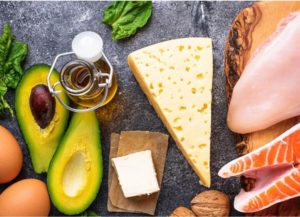 It helps balance blood sugar, decrease risk of heart disease and type 2 diabetes, enhance mood and improve brain function. Fat is also a powerful anti-inflammatory.
It helps balance blood sugar, decrease risk of heart disease and type 2 diabetes, enhance mood and improve brain function. Fat is also a powerful anti-inflammatory.
 It helps balance blood sugar, decrease risk of heart disease and type 2 diabetes, enhance mood and improve brain function. Fat is also a powerful anti-inflammatory.
It helps balance blood sugar, decrease risk of heart disease and type 2 diabetes, enhance mood and improve brain function. Fat is also a powerful anti-inflammatory.
Healthy fats
The rules for consuming fat are simple: Choose naturally occurring healthy fats, found in nuts, seeds, oily fish and minimally processed cold-pressed vegetable oils.
The rules for consuming fat are simple: Choose naturally occurring healthy fats, found in nuts, seeds, oily fish and minimally processed cold-pressed vegetable oils.
Avoid trans fat (check food labels for hydrogenated fat) and limit your intake of saturated animal-based fats like butter, cheese, red meat, and ice cream.
Interesting fact: Omega-3, an important essential fatty acid, plays a crucial role in the functions mentioned above. It is especially high in avocado, flax seeds, salmon and other ily fish.
Two micronutrients, which are:
4. Vitamins

Vitamins help ward off disease and keep you healthy. Powerful antioxidants, these micronutrients are essential support to many body functions, including playing a key role in healthy vision, skin, and bones. Vitamin C for example, boosts the immune system and helps in healing the body.
Best source : Fresh organic fruits and vegetables, and minimally processed foods. Ensure a vast and varied diet, and you just can’t go wrong.
Interesting fact: Vitamins are either fat-soluble or water-soluble. Water-soluble vitamins need to be consumed daily, while fat-soluble vitamins can be stored in the body for longer.
5. Minerals
Like vitamins, minerals too su pport many critical body functions. Calcium for example, is needed to build strong bones and teeth, iron is essential for carrying oxygen to the red blood cells, zinc helps the body process carbs, fat and protein in the food, and so on.
pport many critical body functions. Calcium for example, is needed to build strong bones and teeth, iron is essential for carrying oxygen to the red blood cells, zinc helps the body process carbs, fat and protein in the food, and so on.
 pport many critical body functions. Calcium for example, is needed to build strong bones and teeth, iron is essential for carrying oxygen to the red blood cells, zinc helps the body process carbs, fat and protein in the food, and so on.
pport many critical body functions. Calcium for example, is needed to build strong bones and teeth, iron is essential for carrying oxygen to the red blood cells, zinc helps the body process carbs, fat and protein in the food, and so on.
Healthy source: Nuts and seeds, beans and lentils, whole grains, dark leafy greens, seafood, low-fat meat and dairy are rich in many of the essential minerals. Do look up specific ones.
Interconnectedness fact: The minerals in the earth’s crust that break down over time to form soil are absorbed by plants and transformed into essential nutrients your body can use.
6. Water
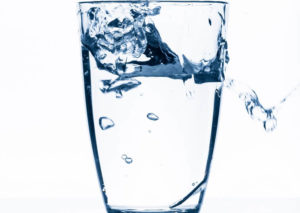
Ever noticed how even a mild dehydration makes you all tired and head-achy? Lack of water can impair both your mental and physical performance.
Most of us take water for granted. But the fact is that over 60% of our body is water. It is water that carries most of the nutrients we need to survive. It improves brain function and mood. It helps flush out toxins, carry nutrients to our cells and keep our body healthy. In fact, you’ll find that water is crucial for the working of practically every system in our body.
Healthy source: H2O is all very well, but fruits and veggies are a great source of water too. Some more than others, like dark green leafy vegetables, cucumber and watermelon.
Do you know? How to check if you are properly hydrated? Take a quick look at the colour and volume of your urine. The more frequent your urine and the clearer its colour the better hydrated you are.
And, two other essential nutrients, which are:
7. Fibre
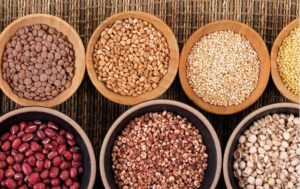
Fibre, also known as roughage, is the indigestible part of plant-based foods. Fibre passes through the intestines relatively intact. On its journey down though, fiber does a lot of work.
The soluble part of it turns to gel in the stomach and regulates the speed of digestion. It allows for greater absorption of nutrients and contributes to the feeling of being full, or satiety. It also lowers cholesterol levels, thus reducing the risk of coronary artery disease, and it reduces the risk of type 2 diabetes by helping control blood sugar levels — useful for people with any type of sugar problem.
The insoluble part of fibre helps clean the intestinal tract and makes it easier for you to poop.
Fibre rich foods includes fruits and vegetables; grains and beans; nuts and seeds, and that’s all there is to it.
Reasons why fibre helps you lose weight: It has fewer calories. It is bulky and fills you up faster. It speeds up your digestion, so less fat is absorbed. It eliminates insulin spikes that drain you out and leave you craving unhealthy foods. For more on fibre read Fit or Fat.
In short… diversify, diversify & diversify your diet.
How much of each

Fads, opinions and advice are a dime a dozen, but where your health is concerned, use common sense. Just remember that a varied diet full of fruits, vegetables, healthy proteins and fats, and whole grains is the best way to get these essential nutrients.
Eat more colour
One last word before you dig in. Colorful plants contain some beneficial chemicals that keep them healthy. These phytonutrients, as they are called, are great for us humans too. Though not considered essential for life, they are antioxidant and anti-inflammatory. They are also said to enhance immunity, repair and detoxify our body. The easiest way to make sure you get plenty is to eat many coloured foods.

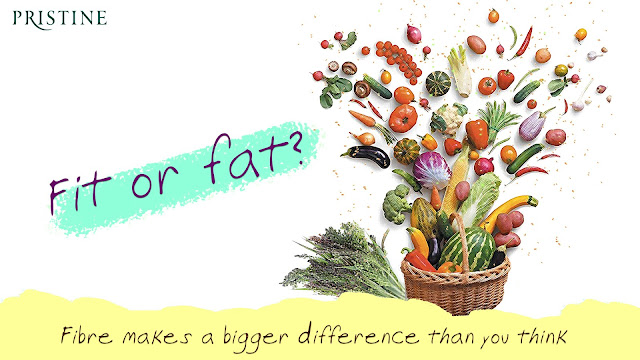

Buy Organic Herbal Tea 100gm online at Rs 113 Nimbark organic herbal tea is one of the bestselling organic tea products in India. Their organic herbal tea is a great phenomenon to boost healthy living.
ReplyDeleteBuy 100% Organic Aloe Vera Juice 500ml online Nimbark Aloe Vera juice is 100% organic and it’s highly rich in antioxidants, which help fight free radicals.
ReplyDeleteBest Organic food Brand in India Nimbark Foods brings you premium quality products of natural-based nourishments. You can buy Basmati rice white, Jammu basmati rice, Rajma Jammu Himalayan Kidney Beans, etc.
ReplyDeleteBuy Organic Flour Online Nimbark Foods is India’s top-rated organic food brand that provides 100% organic foods products to consumers.
ReplyDeleteBuy Organic Tea Online Nimbark Foods Sugar-Free Dyab Tea is a blend of freshly-plucked herbs that keeps the body fit, metabolic rate high and does not cause a spike in your sugar levels.
ReplyDeleteNimbark brings you best Organic Food Products for your good health. Their produce is nourished by fertile mineral-rich soil of the Himalayans, organic manure and snow melted waters from river Chenab.
ReplyDeleteBuy Organic Essential Oils Online Nimbark Foods brings you one of the best quality organic products. Choose from a variety of organic oils for skin and hair care, such as organic almond oil, organic avocado oil, organic apricot oil and organic lavender oil. Nimark Foods Organic Essential Oils smell great, treat fungal infections, boost mood, improve sleep, and reduce stress.
ReplyDeleteNimbark Foods is the Best Organic Food Brand in India Shop a wide range of organic food products at the convenience of your home. You can buy a wide selection of foods namely; Sarveshwar Jammu Traditional, Organic Almond cookies, Arhar Dal, Diabetic Care Juice, Rajma Jammu Himalaya Kidney beans.
ReplyDeletePatankar Farm Products brings the wide range of organic products all over India.
ReplyDelete